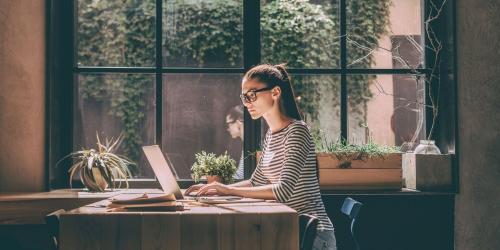Emitted from LED screens and bulbs, it is part of the spectrum of light, a short wavelength that produces a large amount of energy.
Pauline Cousseau, founder of the glasses brand Polette, details its effects on our health.
What exactly is blue light?
By blue light is meant the rays, present in natural light, corresponding to wavelengths between 446 and 500 nm.
Among these rays, the shortest wavelengths correspond to the blue-violet light. It is present in natural light, but it is also abundantly produced by screens as well as by some LED lighting systems.
Blue light is considered dangerous after a 30-minute exposure. It is therefore necessary to protect oneself, especially when working all day in front of a screen.
A light that turns our biological clock upside down
When the eye receives it, it excites our retina and prevents it from producing enough melatonin. This hormone, produced by a gland present in the brain, is nevertheless essential to regulate our sleep and waking rhythms.
"Because of the blue light, the brain is in 'day' mode and the body is not prepared for sleep," explains Pauline Cousseau. Our biological clock is then shifted and the duration, as well as the quality, of the sleep are modified.
Result: our ability to recover the tiredness accumulated during the day is altered.
Eye disorders related to blue light
Blue light also creates retinal dryness. Also, it tends to aggravate headaches and migraines.By making its way from the retina to the optic nerve, where light-sensitive cells are found, it intensifies the already existing pains. Sensitive cells are stimulated by blue light and alert the thalamus, the region of the brain that senses pain.
Worse, some scientific studies link overexposure of the eye to blue-violet light and premature aging of the lens or even the appearance of serious pathologies such as age-related macular degeneration (AMD) or cataract.
What solutions to screen blue light?
While it seems futile to try to do without screens in our time, it is nevertheless possible to block their blue light with glasses.
Like those offered by Polette, Pauline Cousseau's brand, more and more brands (Edie & Watson, IZIPIZI or Blueberry) now offer pairs with a patented technology "anti-blue light".
This is a kind of yellow filter that reduces the emission of blue light by up to 40%. They help to reduce eye strain and help you get back to sleep light and restful, even after spending a whole day in front of the computer.
People with various eye disorders can also benefit from this technology since today most opticians offer pairs of glasses with lenses not only corrective, but also anti-blue light.
Another option is to install filters directly on our screens.
On smartphones, just download applications that will act as a filter to prevent blue light emissions. A simple and free trick to save migraines and manage to fall asleep, even as we end the evening taped to a screen ...


